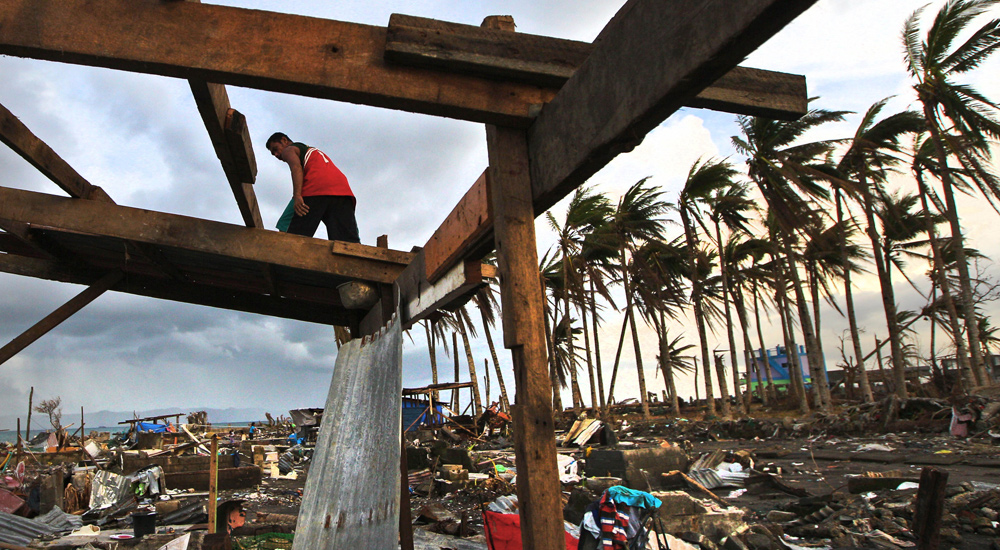
A Filipino man climbs up on a wooden structure as he rebuilds his house in a neighborhood devastated by Typhoon Haiyan in Tacloban, Philippines, Thursday, Nov. 21, 2013. Hundreds of thousands of people were displaced by Typhoon Haiyan, which tore across several islands in the eastern Philippines on Nov. 8. (AP Photo/Dita Alangkara)
DULAG, Leyte, Philippines—Every nail Florentino Homeris hammers down takes him one step closer to rebuilding his typhoon-wrecked house and one step further from life with the daughter he lost.
The 32-year-old laborer has no choice but to try to create a new dwelling for his wife and baby after his wooden shack was destroyed when Supertyphoon “Yolanda” smashed through the Philippines, killing more than 5,200 people.
He scrabbles around in the mud to find whatever building materials he can—pieces of sodden lumber, tin sheets warped and twisted by the powerful winds, and crooked nails pulled from splintered planks.
All were probably part of someone else’s home before the storm.
On a tiny patch of sand in the ruined coastal town of Dulag where his one-room shack once stood, Homeris had just finished the frame of what he hoped would be a replica of the one he built for his new family five years ago.
“But I cannot remember the exact way the house looked,” he said. “There was a small kitchen and a door here,” he said pointing to a vacant space.
He is also short on useable materials. “I will have to look for tin roofing from somewhere later today.”
The loss of his 5-year-old girl in the storm is yet to completely sink in. The absence of any proper Catholic burial for this devoutly religious man does not help.
“I see her in my dreams,” he said, choking back tears. “But she is there, in a body bag. I have given my permission for her to be in the mass grave.”
“I have another child and a wife who need to live too, but it is very difficult,” he added as he tried unsuccessfully to straighten a rusty nail.
On the night before Yolanda tore into Eastern Visayas on Nov. 8, Homeris took his wife, 5-year-old daughter and baby boy to a school.
He thought they would be safe there from the vicious winds, but he did not count on giant waves washing ashore and into the concrete building, taking his daughter.
Such storm surges were the main killer across the worst-hit central islands of Leyte and Samar.
The government says about 4.3 million people lost their homes in the typhoon, double the number of those made homeless by the Indian Ocean tsunami of 2004.
Experts say it will cost billions of dollars and many years to rebuild the destroyed communities.
A giant reconstruction effort involving the government, the United Nations, the World Bank and a plethora of nongovernment organizations is starting to kick in.
But Homeris—like many other fishermen, farmers and other people who barely earned enough money to survive before the storm—must act now.
Every day without a home is another day his wife and baby must sleep on the hard ground under a tarpaulin advertisement for a local mobile phone company. AFP
RELATED STORIES:
NPA extends ceasefire in areas devastated by ‘Yolanda’ for 1 month
Chopper carrying Yolanda relief supplies crashes into Manila Bay
Aquino to mark ‘Yolanda’ supplemental bill urgent